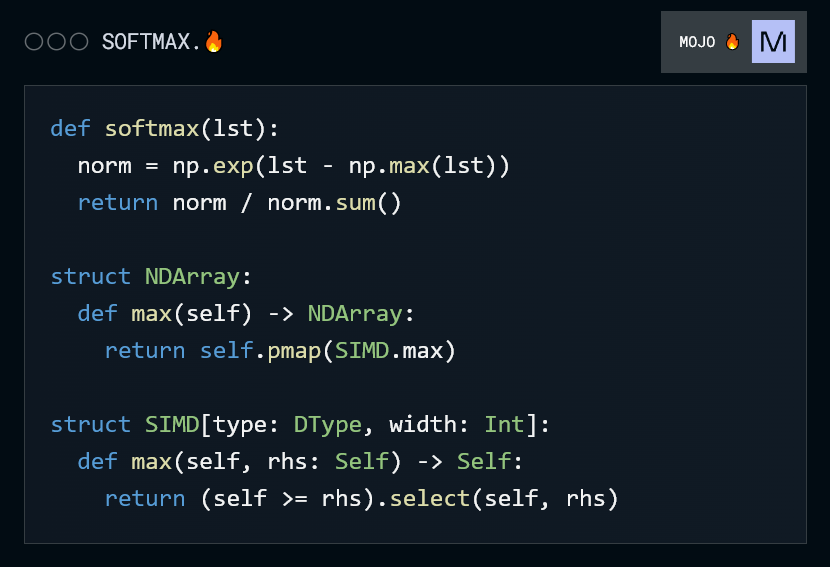Evolution of Python Programming for Artificial Intelligence and Machine Learning with Mojo

Python has become the de facto programming language in the field of artificial intelligence (AI) and machine learning (ML) due to its simplicity, flexibility, and rich ecosystem. However, Python’s current implementation, CPython, faces several limitations when it comes to systems programming and performance, giving rise to the ‘two-world problem’ where Python and low-level languages like C and C++ must coexist to achieve high performance.
Introduction to Mojo
Mojo is a new programming language designed to address these challenges, seamlessly integrating with the existing Python ecosystem and providing a solution that unifies systems programming and AI/ML development. Mojo aims to leverage Python’s strengths while overcoming its performance limitations, and accommodating the growing complexity of heterogeneous hardware accelerators and deployment challenges.
Mojo’s Key Features and Compatibility
Mojo is designed to be fully compatible with the Python ecosystem, allowing developers to run existing Python3 code ‘out of the box’ using CPython’s runtime. This ensures full compatibility with the entire Python ecosystem, while also enabling a smooth migration path for Python code to Mojo.
Compatibility with the Python Ecosystem
Mojo is a powerful programming language designed as a superset of Python, with features such as strong type checking, overloaded functions, and stricter function declarations (fn). These enhancements provide more control, predictability, and safety in code, making Mojo particularly suitable for systems programming and AI/ML development.
Strong Type Checking
Mojo allows you to employ strong type checking using its struct type. This ensures that the correct data types are used and provides compile-time errors for any mismatches.
def pairTest() -> Bool:
let p = MyPair(1, 2)
# Uncomment to see an error:
# return p < 4 # gives a compile time error
return True
Overloaded Functions & Methods
Mojo supports overloaded functions and methods, allowing you to define multiple functions with the same name but different arguments. This is a common feature in languages like C++, Java, and Swift.
struct Complex:
var re: F32
var im: F32
fn __init__(self&, x: F32):
self.re = x
self.im = 0.0
fn __init__(self&, r: F32, i: F32):
self.re = r
self.im = i
Stricter Function Declarations (fn)
Mojo introduces the fn declaration, which is a stricter version of the def declaration. While both fn and def are interchangeable on an interface level, fn enforces more restrictions in its body, making it suitable for systems programming.
fn example() -> Void:
let x: F32 = 5.0
# Local variables must be declared explicitly
let y: F32 = 3.0
# Argument values are immutable by default
let z: F32 = 2.0 + x
# Type specifications for arguments and return values are required
fn example(x: F32, y: F32) -> Void:
// ...
Strong Type Checking, Overloaded Functions, and the ‘fn’ Declaration in Mojo
Mojo extends Python’s capabilities by offering strong type checking, overloaded functions, and a stricter alternative to the def declaration. These features cater to the needs of systems programmers and developers who seek more control, predictability, and safety in their code.
Modular Presentation
Mojo is designed to be modular, allowing developers to easily integrate it with existing Python code and libraries. This is achieved through a unified extensible platform that provides a flexible way to extend and customize the language.
Unified Extensible Platform
The unified extensible platform provided by Mojo allows developers to create custom modules and extensions that can be easily integrated into their code. This enables a high degree of flexibility and customization, making it easy to adapt to changing requirements and needs.
Conclusion
Mojo is a powerful programming language designed to bridge the gap between systems programming and AI/ML development in the Python ecosystem. Its strong type checking, overloaded functions, and stricter function declarations make it an ideal choice for developers who seek more control, predictability, and safety in their code. With its modular presentation and unified extensible platform, Mojo has the potential to revolutionize AI/ML development and improve performance across the board.
References
By providing a unified extensible platform and a modular presentation, Mojo enables developers to create custom modules and extensions that can be easily integrated into their code. This high degree of flexibility and customization makes it easy to adapt to changing requirements and needs.
Future Developments
Mojo is an ongoing project, and future developments will focus on further improving its capabilities and performance. Some potential features and improvements include:
- Improved Type Checking: Enhancing Mojo’s type checking capabilities to provide even stronger guarantees about the correctness of code.
- Enhanced Modularity: Developing new modules and extensions that can be easily integrated into existing code, enabling a high degree of flexibility and customization.
- Better Performance: Optimizing Mojo’s performance to achieve even faster execution times and better scalability.
By continuously improving its features and capabilities, Mojo has the potential to become an industry-standard language for AI/ML development, providing developers with a powerful tool for creating high-performance applications.